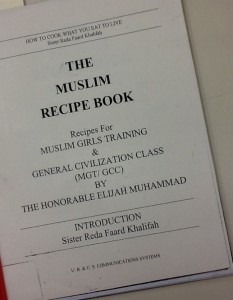By: Laci Thompson, MA student in American Studies
Our pedagogy series is a way to highlight innovative teaching using primary sources housed in the Division of Special Collections. This post is our final portion of our series dedicated to Dr. Morgan’s American Folklore course.
Cool cookbooks galore are waiting to be discovered at Hoole Library—and they are guaranteed to make your stomach start to rumble too. During a recent class unit on Southern Foodways, my American Studies classmates and I met at Hoole to look at the cookbooks housed in the David Walker Lupton Collection. Besides cookbooks, the Hoole archive includes texts from the first 100 years of the printing press, ancient coins, and early modern artifacts. In the last 30 years or so, the collection has expanded to include more popular culture texts such as the cookbooks we analyzed.
Foodways can be an extremely valuable lens through which to study a culture. Far from being mere collections of recipes, cookbooks raise several questions whose answers can illuminate cultural settings and actions in a new light: Who is served and who does the serving? What ingredients are used and are they traditional or do they show the influence of outside cultures? What role does religion play in food? How are present cultural and social realities portrayed through these books? How might this lived experience differ depending on race or gender or any other number of factors? How is history both reflected and revised through cookbooks that harken to a past era?
These are some of the questions that I had on my mind when I picked up The Muslim Recipe Book: Recipes for Muslim Girls Training and General Civilization Class by the Honorable Elijah Muhammad. This collection of recipes consists of xeroxed pages and is housed in a clear binder. Such aesthetics emphasize its local readership. Over half of its 48 pages are dedicated to outlining the principles of Islam and tenets of Black Nationalism. Far from being merely recipes, it stands as a testament of the communal nature and importance of Islam, being directed at both practicing Muslims as well as those with a possible interest in the religion.
The text is particularly fascinating because although it is clearly influenced by 1960s Black Nationalism—mirroring in many ways the 1966 Black Panther Party Platform—it was published in 1995 in Hampton, Virginia. It seems to be a document that rather than revising or reflecting on its historical roots has simply been plucked up from one time and transplanted into another very different historical setting. How might this affect its audience and usefulness?
Culture is also reflected through the recipes themselves: simple ingredients make for easily cooked meals and serving sizes are never fewer than 2 or more than 6, reflecting the importance of the family unit to both the authors and the audience (young girls learning to cook while they also learn tenets of Islam and Black Nationalism). Nods to Islamic roots and sites of historical significance are made through the inclusion of recipes from around the world such as Egyptian Style Cauliflower and Arabic Style Stuffed Zucchini Squash. Religion, politics, countercultural social movements and gender expectations all intersect in fascinating ways throughout this cookbook.
This is just one of the many gems awaiting further study at Hoole. My classmates found texts ranging from Bobby Seale’s BBQ book to Pre-Prohibition drink recipes to Soul Food cookbooks decked out in tie-dye. Go take a look and see what yummy—and culturally illuminating—treasures are waiting for you!


